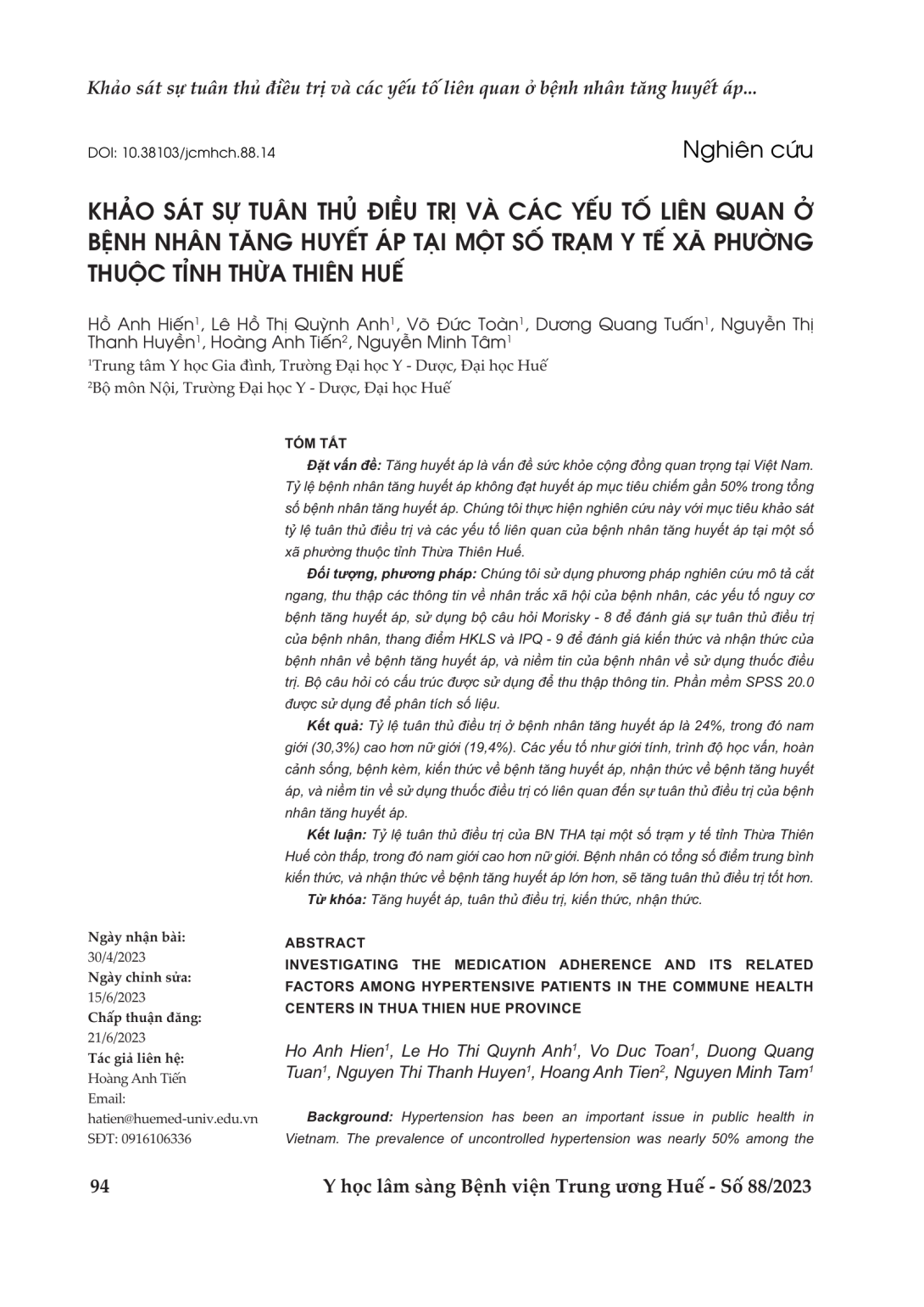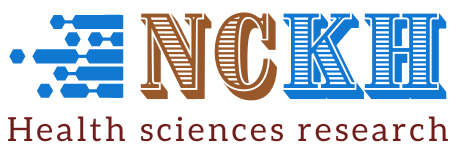
Tăng huyết áp là vấn đề sức khỏe cộng đồng quan trọng tại Việt Nam. Tỷ lệ bệnh nhân tăng huyết áp không đạt huyết áp mục tiêu chiếm gần 50% trong tổng số bệnh nhân tăng huyết áp. Chúng tôi thực hiện nghiên cứu này với mục tiêu khảo sát tỷ lệ tuân thủ điều trị và các yếu tố liên quan của bệnh nhân tăng huyết áp tại một số xã phường thuộc tỉnh Thừa Thiên Huế. Đối tượng, phương pháp: Chúng tôi sử dụng phương pháp nghiên cứu mô tả cắt ngang, thu thập các thông tin về nhân trắc xã hội của bệnh nhân, các yếu tố nguy cơ bệnh tăng huyết áp, sử dụng bộ câu hỏi Morisky - 8 để đánh giá sự tuân thủ điều trị của bệnh nhân, thang điểm HKLS và IPQ - 9 để đánh giá kiến thức và nhận thức của bệnh nhân về bệnh tăng huyết áp, và niềm tin của bệnh nhân về sử dụng thuốc điều trị. Bộ câu hỏi có cấu trúc được sử dụng để thu thập thông tin. Phần mềm SPSS 20.0 được sử dụng để phân tích số liệu. Kết quả: Tỷ lệ tuân thủ điều trị ở bệnh nhân tăng huyết áp là 24%, trong đó nam giới (30,3%) cao hơn nữ giới (19,4%). Các yếu tố như giới tính, trình độ học vấn, hoàn cảnh sống, bệnh kèm, kiến thức về bệnh tăng huyết áp, nhận thức về bệnh tăng huyết áp, và niềm tin về sử dụng thuốc điều trị có liên quan đến sự tuân thủ điều trị của bệnh nhân tăng huyết áp. Kết luận: Tỷ lệ tuân thủ điều trị của BN THA tại một số trạm y tế tỉnh Thừa Thiên Huế còn thấp, trong đó nam giới cao hơn nữ giới. Bệnh nhân có tổng số điểm trung bình kiến thức, và nhận thức về bệnh tăng huyết áp lớn hơn, sẽ tăng tuân thủ điều trị tốt hơn.
Hypertension has been an important issue in public health in Vietnam. The prevalence of uncontrolled hypertension was nearly 50% among the hypertensive population in Vietnam. The objective of this study was to investigate the prevalence of medication adherence and its associated factors among patients with hypertension in the commune health centers in Thua Thien Hue Province. Methods: The study was a cross - sectional survey in which sociodemographic characteristics, hypertension risk factors, the eight - item Morisky Medication Adherence Scale (MMAS - 8), the hypertension knowledge - level scale (HK - LS), the brief Illness Perception of hypertension, and the beliefs about hypertension medication were measured and explored in terms of their relationship with medication adherence. A structured questionnaire was used as a data collection tool. The data were then analyzed with the help of SPSS version 20.0. Results: A total of 279 patients participated in the survey; 24,0% (30,3% in men and 19,4% in women) were adherent to their hypertension medication. The factors significantly associated with better medication adherence were gender, educational status, family background, comorbidity, knowledge about hypertension, illness perception of hypertension, and beliefs about hypertension medication. Conclusion: The rate of treatment adherence of hypertensive patients at some health stations in Thua Thien Hue province is still low, of which men are higher than women. Patients with a greater mean score of knowledge, and awareness of hypertension, will have better adherence to treatment.
- Đăng nhập để gửi ý kiến
